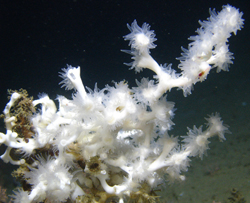Sailing to save threatened coral
|
Temple University biologist Erik Cordes and a team of researchers are developing a means for protecting vital coral communities from an expanding frontier of thousands of oil platforms pushing deeper into the waters of the Gulf of Mexico. The cruise into the Gulf — on which Cordes will be the co-chief scientist — will take place Aug. 19 through Sept. 12. MMS is providing the science budget, while NOAA is providing its flagship research vessel, the Ronald H. Brown, and the funding for the ROV Jason II, the remotely operated vehicle from Woods Hole Oceanographic Institute, which can operate at a depth of 6,500 meters. |
 Courtesy Erik Cordes
Erik Cordes and his team of researchers work to learn about and protect coral, like the one shown here, and its many beneficial uses.
|
|
Cordes said saving and protecting these corals is important because they provide a habitat for diverse species of fish and other organisms, have potential to produce natural anti-microbial and anti-cancer agents and form an important link in the carbon cycle between the shallow, productive surface waters and the deep sea. “The Minerals Management Service is responsible for managing all of the off-shore oil leases in the U.S.,” said Cordes, an assistant professor of biology in the College of Science and Technology. “The prime objective for them in this project is to develop a better way of predicting where these coral communities might be. When we actually find one of these coral sites, they set up what is called a mitigation area around it and the oil companies are prohibited from drilling within the small area that has designated as a preserve.” Cordes said the coral areas on the ocean floor are relatively small; the largest coral community located so far in the Northern Gulf is only a few hundred meters in diameter. “The oil company can move a half-mile away to avoid these coral communities and still hit the same oil reservoir,” he said. Cordes said the oil companies have been very supportive and cooperative by sharing data, and in some cases, collecting samples for the researchers. “This is a new and interesting challenge for them.” During the upcoming cruise, the researchers will also visit five shipwrecks and survey some of the existing oil rigs to see if corals are growing on them. “We’re also going to be using the ROV to collect live corals, maintain them on the ship, then bring them back to our lab here at Temple, where we have a series of experimental tanks set up in our cold room,” said Cordes. He said they would be testing the environmental tolerances of corals, including growth rates, temperature preferences and reaction to acidification. “That’s one of the newer, less-publicized concerns about climate change — ocean acidification,” said Cordes. “As you increase CO2 (carbon dioxide) in the atmosphere, the pH level of the ocean is going down; it’s getting more and more acidic. Cordes said the increase in acidity is making it harder and harder for corals to lay down their skeleton. “That’s one of the things we’re looking at: how acidic does it have to get before it starts affecting their growth rates.” Cordes is collaborating on the project with researchers from Penn State, Louisiana State University, Texas A&M Corpus Christi, and the Woods Hole Oceanographic Institution.
|
|